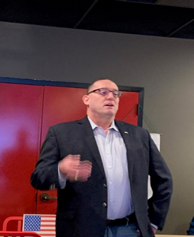North Notes
Spokane-North Rotary Club Bulletin
November 21, 2022
Calendar:
Nov. 28: Noon lunch at the Bark. Speaker: “Empty Table” presentation honoring veterans.
Dec. 5: Noon lunch at the Bark. Speaker: TBA. Gifts due for holiday Holmes project.
Happy Bucks:
Bill Simer was happy for the club’s cruise outing and for the Zags’ big win over Kentucky.
John Mailliard was happy for his grandchildren joining for the Holmes gifts outing, gathering canned goods for GU and helping with the Tom’s Turkey bags.
Ron Noble was happy to recall a 1991 Rotary exchange student from Japan and Thanksgiving memories.
Lenore Romney also was happy for the cruise and dinner outing.
Steve Bergman is happy that his son, stationed abroad, will be assigned to a recruiting station in Oregon.
Announcements:
Tag time: Holmes gift project coordinator Lenore Romney said just three tags remained to achieve the “40 for $60” campaign. Gifts –wrapped, but with identifying Holmes letters –should be brought to the Dec. 5 luncheon or arrange delivery to Lenore or Michelle Fossum.
A special luncheon
As noted above, the Nov. 28 noon luncheon will feature an “Empty Table” presentation by former club member Terry Fossum to honor veterans.
To conclude the club’s month-long programs about veterans' issues, all club members will be honored and are invited to show pictures of their times in military service.
Law helps vets return to civilian jobs
To make it easier for returning veterans to resume former jobs, federal law created USERRA – the Uniformed Service Employment and Reemployment Rights Act.
At the club’s Nov. 21 luncheon Spokane attorney Thomas G. Jarrad explained the provisions of the law, enacted in 1941.
 Jarrad said the law was created after thousands of veterans returning from World War I had difficulties getting back into the workforce.
Jarrad said the law was created after thousands of veterans returning from World War I had difficulties getting back into the workforce. He said as issues mounted after that war and some 43,000 vets and family members demonstrated near the White House in 1932 to protest, leaving only after gas charges were used to dispel the crowd.
A number of federal legislative acts involved helping veterans’ rights, but the major USERRA provisions started just as WWII was beginning.
A stronger law was enacted in 1994 and on Sept. 29 President Biden signed a “CREW” law which extends employment protection to National Guard and reservists who are called to work on FEMA disaster sites.
USERRA covers all employment except those on Native American lands, Jarrad said.
Essentially, Jarrad said, the law “prohibits denying any benefits of employment on the basis of military service.”
Returning vets have a limited time to ask for civilian jobs back or to challenge seniority and other various benefits to catch up for time lost in military service.
Jarrad, a GU Law grad with 25 years of service, said “since there has not been a draft since 1973 (during the Vietnam War-era), all military service is voluntary and USERRA provides protections from discrimination in the workplace.”
Jarrad said he works on USERRA cases on 200 locations nationally.
One on-line site said 62 percent of reviewed complaints under the act involve discrimination issues and 15 percent of cases involve improper reinstatement to civilian jobs.
He said the law treats veterans “like they never left (for military service).”
Bulletin editors: Chuck Rehberg and Sandy Fink
